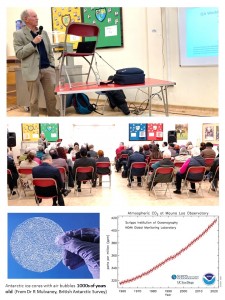 This year we were very privileged in having Professor Geoff Levermore of the University of Manchester as our speaker for the Alf Keeling Memorial Lecture. He has been researching the effects of climate change and was the UK lead author of the Intergovernmental Panel on Climate Change (IPCC) Fourth Assessment Report which was awarded the Nobel Peace prize in 2007. The subject of his talk was Climate Change, Religion and Ethics.
This year we were very privileged in having Professor Geoff Levermore of the University of Manchester as our speaker for the Alf Keeling Memorial Lecture. He has been researching the effects of climate change and was the UK lead author of the Intergovernmental Panel on Climate Change (IPCC) Fourth Assessment Report which was awarded the Nobel Peace prize in 2007. The subject of his talk was Climate Change, Religion and Ethics.
Over 80 people attended the lecture at St Ambrose Preparatory School in Hale Barns as Professor Levermore explained very clearly the causes of climate change and how Global Warming had now reached such an extent that it would not be possible to achieve the aim of a maximum 1.5° increase in temperature by 2050 and that this was due almost entirely to human activity. Instead, we are on track for a 2.9°C rise which could be reduced to 2.1°C if the net zero plan is implemented. With graphs showing very significant rises in emissions since the industrial revolution, he explained how the composition of the air thousands of years ago could be analysed by using cores of arctic ice that had air bubbles trapped inside, and this compared with modern samples.
The heat islands generated by cities and new tower blocks were also a cause for concern and we need to transform our cities and also cut down on the use of fossil fuels, especially in China which is currently one of the worst offenders. At present, our energy use is the equivalent of 1,800,000 Hiroshima bombs a day, EVERY DAY.
The option of changing lifestyles to mitigate effects was discussed but few people are prepared to do this, and this led on to the issue of religion and what the holy books say about climate change and to ideas about the nature of God, especially as espoused by Professor Gordon Kaufman (1925-2011) who proposed considering God as “creativity,” a concept that excludes no major religious faith.
Finally, Professor Levermore discussed moral and ethical aspects, and the importance of altruistic morality – the best form of morality which involves doing things for people we do not know. He concluded by stressing the importance of immediate and rapid change, and that it is our moral duty to assist in this as much as possible.
There was a lively question and answer session afterwards and refreshments were served following the talk. We are sincerely grateful to St Ambrose Preparatory School for the use of their hall and thank everyone who helped to make this event such a success.
Carolyn Jones
(Hon. Sec., Altrincham Interfaith Group)
